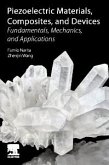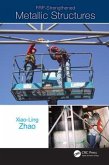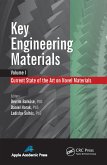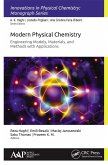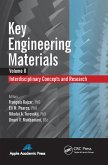Sustainable Materials, Structures and Iot
Herausgeber: Pradhan, Sujit Kumar; Mahmud, Mufti; Sethi, Srinivas
Sustainable Materials, Structures and Iot
Herausgeber: Pradhan, Sujit Kumar; Mahmud, Mufti; Sethi, Srinivas
- Broschiertes Buch
- Merkliste
- Auf die Merkliste
- Bewerten Bewerten
- Teilen
- Produkt teilen
- Produkterinnerung
- Produkterinnerung
The Conference was organized by Department of Civil Engineering, Indira Gandhi Institute of Technology Sarang, India. As a recurring event with nationwide participation, it converged experts, researchers and industry professionals to share and deliberate on their work, offering profound insights into emerging technological trends.
Andere Kunden interessierten sich auch für
![Piezoelectric Materials, Composites, and Devices Piezoelectric Materials, Composites, and Devices]() Fumio NaritaPiezoelectric Materials, Composites, and Devices229,99 €
Fumio NaritaPiezoelectric Materials, Composites, and Devices229,99 €![Frp-Strengthened Metallic Structures Frp-Strengthened Metallic Structures]() Xiao-Ling ZhaoFrp-Strengthened Metallic Structures111,99 €
Xiao-Ling ZhaoFrp-Strengthened Metallic Structures111,99 €![Key Engineering Materials, Volume 1 Key Engineering Materials, Volume 1]() Key Engineering Materials, Volume 1110,99 €
Key Engineering Materials, Volume 1110,99 €![Modern Physical Chemistry: Engineering Models, Materials, and Methods with Applications Modern Physical Chemistry: Engineering Models, Materials, and Methods with Applications]() Modern Physical Chemistry: Engineering Models, Materials, and Methods with Applications109,99 €
Modern Physical Chemistry: Engineering Models, Materials, and Methods with Applications109,99 €![Key Engineering Materials, Volume 2 Key Engineering Materials, Volume 2]() Key Engineering Materials, Volume 2110,99 €
Key Engineering Materials, Volume 2110,99 €![Mechanics of Fiber and Textile Reinforced Cement Composites Mechanics of Fiber and Textile Reinforced Cement Composites]() Barzin MobasherMechanics of Fiber and Textile Reinforced Cement Composites91,99 €
Barzin MobasherMechanics of Fiber and Textile Reinforced Cement Composites91,99 €![Thermal Engineering of Nuclear Power Stations Thermal Engineering of Nuclear Power Stations]() Charles F BowmanThermal Engineering of Nuclear Power Stations79,99 €
Charles F BowmanThermal Engineering of Nuclear Power Stations79,99 €-
-
-
The Conference was organized by Department of Civil Engineering, Indira Gandhi Institute of Technology Sarang, India. As a recurring event with nationwide participation, it converged experts, researchers and industry professionals to share and deliberate on their work, offering profound insights into emerging technological trends.
Hinweis: Dieser Artikel kann nur an eine deutsche Lieferadresse ausgeliefert werden.
Hinweis: Dieser Artikel kann nur an eine deutsche Lieferadresse ausgeliefert werden.
Produktdetails
- Produktdetails
- Verlag: CRC Press
- Seitenzahl: 300
- Erscheinungstermin: 23. Dezember 2024
- Englisch
- Abmessung: 229mm x 152mm x 17mm
- Gewicht: 435g
- ISBN-13: 9781032980423
- ISBN-10: 1032980427
- Artikelnr.: 71955622
- Herstellerkennzeichnung
- Libri GmbH
- Europaallee 1
- 36244 Bad Hersfeld
- gpsr@libri.de
- Verlag: CRC Press
- Seitenzahl: 300
- Erscheinungstermin: 23. Dezember 2024
- Englisch
- Abmessung: 229mm x 152mm x 17mm
- Gewicht: 435g
- ISBN-13: 9781032980423
- ISBN-10: 1032980427
- Artikelnr.: 71955622
- Herstellerkennzeichnung
- Libri GmbH
- Europaallee 1
- 36244 Bad Hersfeld
- gpsr@libri.de
Sujit Kumar Pradhan is currently serving as an Assistant Professor in the Department of Civil Engineering, Indira Gandhi Institute of Technology Sarang, India. He holds PhD in Transportation Engineering from Indian Institute of Technology Bhubaneswar. His area of research includes pavement material characterization, pavement analysis & design, performance evaluation of asphalt binder and recycling, and geotextile and porous concrete. Srinivas Sethi is a Professor in Computer Science Engineering & Application, Indira Gandhi Institute of Technology, Sarang (IGIT, Sarang), India, and has been actively involved in teaching and research since 1997. He did his Ph.D., in routing algorithms in mobile ad hoc network and is continuing his research work in the wireless sensor network, cognitive radio network, and cloud computing, Big-Data, BCI, Cognitive Science. Mufti Mahmud's research vision is to contribute toward a secure, smart, healthy, and better world to live in. He conducts problem-driven Brain Informatics research where he works with problem domain experts to find multidisciplinary solutions to real-world problems. His research involves Computational, Health, and Social Sciences, and uses Neuroscience, Healthcare, Applied Data Science, Computational Neuroscience, Big Data Analytics, Cyber Security, Machine Learning, Cloud Computing, and Software Engineering and plans to develop secure computational tools to advance healthcare access in low-resource settings.
1. Advancements in Sludge Utilization for Sustainable Construction
Practices
2. Properties of layered concrete made of Portland slag cement and Portland
pozzolana cement in a double-layered system
3. Oral Cancer Detection Using Deep Learning Architecture
4. Effective Brain Tumor Classification Using Transfer Learning Approach
with the Help of Recurrent Neural Networks
5. Enhancing Concrete Performance
6. Parametric Appraisal of Dry-Turning of EN24 using Taguchi-WASPAS and
Sunflower Algorithm
7. In-depth exploration of utilizing water hyacinth fibers as a sustainable
method for reinforcing concrete
8. Evaluating Water Hyacinth Ash as a Viable Construction Material
9. Structural and Thermal Analysis of Gas Turbine Blade
10. Flood risk assessment of Brahmani River Basin, Odisha, India
11. Experimental Investigation on Reactive Powder Concrete Incorporating
Expanded Clay Sand
12. A study on multi-fabric weaved bi-directional laminated composites
13. Buckling analysis of glass fiber reinforced polyester composite with
variable stiffness and central cut-outs
14. Flexural Studies on Concrete Beams with Areca Fiber and Lightweight
Aggregates Reinforced with Bamboo
15. Numerical simulations with embedded piezoelectric transducers for
monitoring changes in concrete properties
16. Digital Preservation
17. Influence of Social-Political Conditions on Residential Typology and
Conservation Practices in India
18. AI-based Cognitive Load Analysis of Human Beings Through Working Memory
19. Robust biometric attendance system via content-based feature extraction
and classification of acknowledged sound
20. Multifunctional Composite Materials for Lightweight and Efficient EV
Structures
21. Use of Recycled Concrete Aggregates in Construction
22. River water principle component analysis
23. Fingerprint-based Blood Group Prediction
24. Analysis of CT Scan Lung Cancer Image for Early Prediction
25. Weather Forecasting of a Smart City Using Univariate Time Series
Statistical Models
26. Investigating Slurry Erosion Resistance of HVOF coated SS-409 for
Slurry Transportation System
27. Investigating the Influence of Natural Fibers on Mechanical Properties
of Epoxy Composites
28. Impact Analysis of Groundwater Variability on Groundwater Storage in
Malkangiri, Odisha
29. Characterization of Mechanical Properties of Epoxy Glass Fiber
Reinforced Composite
30. Heart disease prediction using machine learning techniques
31. Numerical Study of Free Vibration of Sandwich FGM Plate
32. Exploring Multilayer Ensemble Learning for Enhanced Human Activity
Recognition
33. Implementing AutoML for Wine Quality Classification Using AutoGluon and
Leaderboard Analysis
34. Decoding E. coli
35. Solid waste management as a supplement to binding material in the
cement and concrete industry
36. Unveiling the Influence
37. Experimental Analysis on CNC-Turning of Nickel-Chromoly Steel in
Different Lubricating Environments using Taguchi Coupled WASPAS Method
38. AI-Powered Surveillance
39. Cardiac Wellness Prediction Using Machine Learning
40. Secure Customer Management Mechanism for Online Banking System
41. A Deep Learning Approach with Adaptive Intelligence for Coal
Classification
42. Metal characterization of AlSi10mg powder using direct metal laser
sintering and corrosion testing using potentiodynamic polarization
measurement
43. Enhancing Network Efficiency of anSD-WAN Infrastructure Implemented
Using Cisco System Technologies
44. e-healthcare system for skin care
45. Properties of cement mortar prepared on blending of ferrochrome dust,
lime, and Portland cement
46. IOT-based Guided Repair of Vehicle Systems for Prevention of Accidents
47. Application of recycled concrete aggregate and fly ash for low-volume
road construction
48. Evaluating 3D Concrete Printing Effectiveness through a Comparative
Study using SVM, Decision Trees, and Random Forest Techniques
49. Predictive Analysis of Fiber Reinforced Concrete Using Construction and
Demolition Waste with Insights from SVR, Decision Trees, and Random Forests
50. Voice-Driven ChatGpt Interface for Divyang Individuals
51. Optimizing Geopolymer Concrete Properties through Red Mud and Fly Ash
with Recycled Water for Sustainable Construction
52. Reclaimed Asphalt Pavement as a Sustainable Material for Pavement
Application
53. State of the Art
54. Single-atom photocatalysts
55. Intelligent Transport Traffic System of Smart Cities using Machine
Learning Techniques
56. Strength Performance of Lightweight Concrete Containing Steel Fibres
and Silica Fume
57. M30 Grade Concrete's Strength Characteristics with a Partial Cement
Replacement Using Dolomite and GGBS
58. Reclamation of Low-Lying Area with Legacy Ash
59. Effectiveness of Nano-Titanium Dioxide on Abrasion Resistance, Fatigue
Response, and Intrinsic Crack Repair Mechanisms in Cementitious Composites
60. Effect of Thermomechanical Processing on Mechanical Properties of
Ferritic Stainless Steel
Practices
2. Properties of layered concrete made of Portland slag cement and Portland
pozzolana cement in a double-layered system
3. Oral Cancer Detection Using Deep Learning Architecture
4. Effective Brain Tumor Classification Using Transfer Learning Approach
with the Help of Recurrent Neural Networks
5. Enhancing Concrete Performance
6. Parametric Appraisal of Dry-Turning of EN24 using Taguchi-WASPAS and
Sunflower Algorithm
7. In-depth exploration of utilizing water hyacinth fibers as a sustainable
method for reinforcing concrete
8. Evaluating Water Hyacinth Ash as a Viable Construction Material
9. Structural and Thermal Analysis of Gas Turbine Blade
10. Flood risk assessment of Brahmani River Basin, Odisha, India
11. Experimental Investigation on Reactive Powder Concrete Incorporating
Expanded Clay Sand
12. A study on multi-fabric weaved bi-directional laminated composites
13. Buckling analysis of glass fiber reinforced polyester composite with
variable stiffness and central cut-outs
14. Flexural Studies on Concrete Beams with Areca Fiber and Lightweight
Aggregates Reinforced with Bamboo
15. Numerical simulations with embedded piezoelectric transducers for
monitoring changes in concrete properties
16. Digital Preservation
17. Influence of Social-Political Conditions on Residential Typology and
Conservation Practices in India
18. AI-based Cognitive Load Analysis of Human Beings Through Working Memory
19. Robust biometric attendance system via content-based feature extraction
and classification of acknowledged sound
20. Multifunctional Composite Materials for Lightweight and Efficient EV
Structures
21. Use of Recycled Concrete Aggregates in Construction
22. River water principle component analysis
23. Fingerprint-based Blood Group Prediction
24. Analysis of CT Scan Lung Cancer Image for Early Prediction
25. Weather Forecasting of a Smart City Using Univariate Time Series
Statistical Models
26. Investigating Slurry Erosion Resistance of HVOF coated SS-409 for
Slurry Transportation System
27. Investigating the Influence of Natural Fibers on Mechanical Properties
of Epoxy Composites
28. Impact Analysis of Groundwater Variability on Groundwater Storage in
Malkangiri, Odisha
29. Characterization of Mechanical Properties of Epoxy Glass Fiber
Reinforced Composite
30. Heart disease prediction using machine learning techniques
31. Numerical Study of Free Vibration of Sandwich FGM Plate
32. Exploring Multilayer Ensemble Learning for Enhanced Human Activity
Recognition
33. Implementing AutoML for Wine Quality Classification Using AutoGluon and
Leaderboard Analysis
34. Decoding E. coli
35. Solid waste management as a supplement to binding material in the
cement and concrete industry
36. Unveiling the Influence
37. Experimental Analysis on CNC-Turning of Nickel-Chromoly Steel in
Different Lubricating Environments using Taguchi Coupled WASPAS Method
38. AI-Powered Surveillance
39. Cardiac Wellness Prediction Using Machine Learning
40. Secure Customer Management Mechanism for Online Banking System
41. A Deep Learning Approach with Adaptive Intelligence for Coal
Classification
42. Metal characterization of AlSi10mg powder using direct metal laser
sintering and corrosion testing using potentiodynamic polarization
measurement
43. Enhancing Network Efficiency of anSD-WAN Infrastructure Implemented
Using Cisco System Technologies
44. e-healthcare system for skin care
45. Properties of cement mortar prepared on blending of ferrochrome dust,
lime, and Portland cement
46. IOT-based Guided Repair of Vehicle Systems for Prevention of Accidents
47. Application of recycled concrete aggregate and fly ash for low-volume
road construction
48. Evaluating 3D Concrete Printing Effectiveness through a Comparative
Study using SVM, Decision Trees, and Random Forest Techniques
49. Predictive Analysis of Fiber Reinforced Concrete Using Construction and
Demolition Waste with Insights from SVR, Decision Trees, and Random Forests
50. Voice-Driven ChatGpt Interface for Divyang Individuals
51. Optimizing Geopolymer Concrete Properties through Red Mud and Fly Ash
with Recycled Water for Sustainable Construction
52. Reclaimed Asphalt Pavement as a Sustainable Material for Pavement
Application
53. State of the Art
54. Single-atom photocatalysts
55. Intelligent Transport Traffic System of Smart Cities using Machine
Learning Techniques
56. Strength Performance of Lightweight Concrete Containing Steel Fibres
and Silica Fume
57. M30 Grade Concrete's Strength Characteristics with a Partial Cement
Replacement Using Dolomite and GGBS
58. Reclamation of Low-Lying Area with Legacy Ash
59. Effectiveness of Nano-Titanium Dioxide on Abrasion Resistance, Fatigue
Response, and Intrinsic Crack Repair Mechanisms in Cementitious Composites
60. Effect of Thermomechanical Processing on Mechanical Properties of
Ferritic Stainless Steel
1. Advancements in Sludge Utilization for Sustainable Construction
Practices
2. Properties of layered concrete made of Portland slag cement and Portland
pozzolana cement in a double-layered system
3. Oral Cancer Detection Using Deep Learning Architecture
4. Effective Brain Tumor Classification Using Transfer Learning Approach
with the Help of Recurrent Neural Networks
5. Enhancing Concrete Performance
6. Parametric Appraisal of Dry-Turning of EN24 using Taguchi-WASPAS and
Sunflower Algorithm
7. In-depth exploration of utilizing water hyacinth fibers as a sustainable
method for reinforcing concrete
8. Evaluating Water Hyacinth Ash as a Viable Construction Material
9. Structural and Thermal Analysis of Gas Turbine Blade
10. Flood risk assessment of Brahmani River Basin, Odisha, India
11. Experimental Investigation on Reactive Powder Concrete Incorporating
Expanded Clay Sand
12. A study on multi-fabric weaved bi-directional laminated composites
13. Buckling analysis of glass fiber reinforced polyester composite with
variable stiffness and central cut-outs
14. Flexural Studies on Concrete Beams with Areca Fiber and Lightweight
Aggregates Reinforced with Bamboo
15. Numerical simulations with embedded piezoelectric transducers for
monitoring changes in concrete properties
16. Digital Preservation
17. Influence of Social-Political Conditions on Residential Typology and
Conservation Practices in India
18. AI-based Cognitive Load Analysis of Human Beings Through Working Memory
19. Robust biometric attendance system via content-based feature extraction
and classification of acknowledged sound
20. Multifunctional Composite Materials for Lightweight and Efficient EV
Structures
21. Use of Recycled Concrete Aggregates in Construction
22. River water principle component analysis
23. Fingerprint-based Blood Group Prediction
24. Analysis of CT Scan Lung Cancer Image for Early Prediction
25. Weather Forecasting of a Smart City Using Univariate Time Series
Statistical Models
26. Investigating Slurry Erosion Resistance of HVOF coated SS-409 for
Slurry Transportation System
27. Investigating the Influence of Natural Fibers on Mechanical Properties
of Epoxy Composites
28. Impact Analysis of Groundwater Variability on Groundwater Storage in
Malkangiri, Odisha
29. Characterization of Mechanical Properties of Epoxy Glass Fiber
Reinforced Composite
30. Heart disease prediction using machine learning techniques
31. Numerical Study of Free Vibration of Sandwich FGM Plate
32. Exploring Multilayer Ensemble Learning for Enhanced Human Activity
Recognition
33. Implementing AutoML for Wine Quality Classification Using AutoGluon and
Leaderboard Analysis
34. Decoding E. coli
35. Solid waste management as a supplement to binding material in the
cement and concrete industry
36. Unveiling the Influence
37. Experimental Analysis on CNC-Turning of Nickel-Chromoly Steel in
Different Lubricating Environments using Taguchi Coupled WASPAS Method
38. AI-Powered Surveillance
39. Cardiac Wellness Prediction Using Machine Learning
40. Secure Customer Management Mechanism for Online Banking System
41. A Deep Learning Approach with Adaptive Intelligence for Coal
Classification
42. Metal characterization of AlSi10mg powder using direct metal laser
sintering and corrosion testing using potentiodynamic polarization
measurement
43. Enhancing Network Efficiency of anSD-WAN Infrastructure Implemented
Using Cisco System Technologies
44. e-healthcare system for skin care
45. Properties of cement mortar prepared on blending of ferrochrome dust,
lime, and Portland cement
46. IOT-based Guided Repair of Vehicle Systems for Prevention of Accidents
47. Application of recycled concrete aggregate and fly ash for low-volume
road construction
48. Evaluating 3D Concrete Printing Effectiveness through a Comparative
Study using SVM, Decision Trees, and Random Forest Techniques
49. Predictive Analysis of Fiber Reinforced Concrete Using Construction and
Demolition Waste with Insights from SVR, Decision Trees, and Random Forests
50. Voice-Driven ChatGpt Interface for Divyang Individuals
51. Optimizing Geopolymer Concrete Properties through Red Mud and Fly Ash
with Recycled Water for Sustainable Construction
52. Reclaimed Asphalt Pavement as a Sustainable Material for Pavement
Application
53. State of the Art
54. Single-atom photocatalysts
55. Intelligent Transport Traffic System of Smart Cities using Machine
Learning Techniques
56. Strength Performance of Lightweight Concrete Containing Steel Fibres
and Silica Fume
57. M30 Grade Concrete's Strength Characteristics with a Partial Cement
Replacement Using Dolomite and GGBS
58. Reclamation of Low-Lying Area with Legacy Ash
59. Effectiveness of Nano-Titanium Dioxide on Abrasion Resistance, Fatigue
Response, and Intrinsic Crack Repair Mechanisms in Cementitious Composites
60. Effect of Thermomechanical Processing on Mechanical Properties of
Ferritic Stainless Steel
Practices
2. Properties of layered concrete made of Portland slag cement and Portland
pozzolana cement in a double-layered system
3. Oral Cancer Detection Using Deep Learning Architecture
4. Effective Brain Tumor Classification Using Transfer Learning Approach
with the Help of Recurrent Neural Networks
5. Enhancing Concrete Performance
6. Parametric Appraisal of Dry-Turning of EN24 using Taguchi-WASPAS and
Sunflower Algorithm
7. In-depth exploration of utilizing water hyacinth fibers as a sustainable
method for reinforcing concrete
8. Evaluating Water Hyacinth Ash as a Viable Construction Material
9. Structural and Thermal Analysis of Gas Turbine Blade
10. Flood risk assessment of Brahmani River Basin, Odisha, India
11. Experimental Investigation on Reactive Powder Concrete Incorporating
Expanded Clay Sand
12. A study on multi-fabric weaved bi-directional laminated composites
13. Buckling analysis of glass fiber reinforced polyester composite with
variable stiffness and central cut-outs
14. Flexural Studies on Concrete Beams with Areca Fiber and Lightweight
Aggregates Reinforced with Bamboo
15. Numerical simulations with embedded piezoelectric transducers for
monitoring changes in concrete properties
16. Digital Preservation
17. Influence of Social-Political Conditions on Residential Typology and
Conservation Practices in India
18. AI-based Cognitive Load Analysis of Human Beings Through Working Memory
19. Robust biometric attendance system via content-based feature extraction
and classification of acknowledged sound
20. Multifunctional Composite Materials for Lightweight and Efficient EV
Structures
21. Use of Recycled Concrete Aggregates in Construction
22. River water principle component analysis
23. Fingerprint-based Blood Group Prediction
24. Analysis of CT Scan Lung Cancer Image for Early Prediction
25. Weather Forecasting of a Smart City Using Univariate Time Series
Statistical Models
26. Investigating Slurry Erosion Resistance of HVOF coated SS-409 for
Slurry Transportation System
27. Investigating the Influence of Natural Fibers on Mechanical Properties
of Epoxy Composites
28. Impact Analysis of Groundwater Variability on Groundwater Storage in
Malkangiri, Odisha
29. Characterization of Mechanical Properties of Epoxy Glass Fiber
Reinforced Composite
30. Heart disease prediction using machine learning techniques
31. Numerical Study of Free Vibration of Sandwich FGM Plate
32. Exploring Multilayer Ensemble Learning for Enhanced Human Activity
Recognition
33. Implementing AutoML for Wine Quality Classification Using AutoGluon and
Leaderboard Analysis
34. Decoding E. coli
35. Solid waste management as a supplement to binding material in the
cement and concrete industry
36. Unveiling the Influence
37. Experimental Analysis on CNC-Turning of Nickel-Chromoly Steel in
Different Lubricating Environments using Taguchi Coupled WASPAS Method
38. AI-Powered Surveillance
39. Cardiac Wellness Prediction Using Machine Learning
40. Secure Customer Management Mechanism for Online Banking System
41. A Deep Learning Approach with Adaptive Intelligence for Coal
Classification
42. Metal characterization of AlSi10mg powder using direct metal laser
sintering and corrosion testing using potentiodynamic polarization
measurement
43. Enhancing Network Efficiency of anSD-WAN Infrastructure Implemented
Using Cisco System Technologies
44. e-healthcare system for skin care
45. Properties of cement mortar prepared on blending of ferrochrome dust,
lime, and Portland cement
46. IOT-based Guided Repair of Vehicle Systems for Prevention of Accidents
47. Application of recycled concrete aggregate and fly ash for low-volume
road construction
48. Evaluating 3D Concrete Printing Effectiveness through a Comparative
Study using SVM, Decision Trees, and Random Forest Techniques
49. Predictive Analysis of Fiber Reinforced Concrete Using Construction and
Demolition Waste with Insights from SVR, Decision Trees, and Random Forests
50. Voice-Driven ChatGpt Interface for Divyang Individuals
51. Optimizing Geopolymer Concrete Properties through Red Mud and Fly Ash
with Recycled Water for Sustainable Construction
52. Reclaimed Asphalt Pavement as a Sustainable Material for Pavement
Application
53. State of the Art
54. Single-atom photocatalysts
55. Intelligent Transport Traffic System of Smart Cities using Machine
Learning Techniques
56. Strength Performance of Lightweight Concrete Containing Steel Fibres
and Silica Fume
57. M30 Grade Concrete's Strength Characteristics with a Partial Cement
Replacement Using Dolomite and GGBS
58. Reclamation of Low-Lying Area with Legacy Ash
59. Effectiveness of Nano-Titanium Dioxide on Abrasion Resistance, Fatigue
Response, and Intrinsic Crack Repair Mechanisms in Cementitious Composites
60. Effect of Thermomechanical Processing on Mechanical Properties of
Ferritic Stainless Steel


